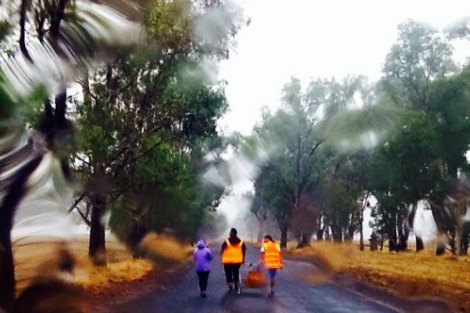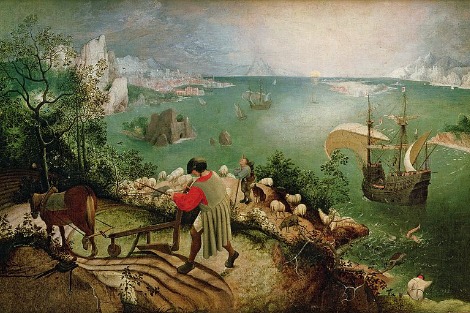Keywords: Maureen O'brien
-

ARTS AND CULTURE
- Maureen O'Brien
- 20 March 2019
14 Comments
On the morning of your last day there are eight people, including me and my daughter, who is a music therapist and has played music for people as they die as part of her clinical practice. After discussions during the week, first with you and then with your neurologist, it was decided that she will sing for you and the people with you today.
READ MORE 
-

ARTS AND CULTURE
- Maureen O'Brien
- 24 July 2018
5 Comments
Our last walk together on a beach takes place on a balmy autumn day. The sun shining, the sea calm. While there is something beautiful about that scene and moment, I wonder, in retrospect, why I said, 'This is almost like being in heaven.' Unconscious, prophetic words, or simply an acknowledgement of perfection in my mind's eye?
READ MORE 
-

ARTS AND CULTURE
- Bill Rush, Marlene Marburg, Maureen O'Brien, John Cranmer
- 22 May 2017
3 Comments
Cars will be turned into flutes; sheep graze in public parks. Trams will be lined with books; prisons, wisteria-walled. Politicians will sing in choirs; accountants taught to tango. The old will have honour and cake and a licence for practical jokes. The middle-aged will lie on grass and watch the procession of clouds. The young will be loved and learn that to live is to be slowly born.
READ MORE 
-

ARTS AND CULTURE
- Maureen O'Brien
- 22 November 2016
5 Comments
Recently I went with a group of friends to see the musical Dusty. Afterwards, walking with one of my friends, I spoke about how special it had turned out for me seeing this musical on the day after my 54th wedding anniversary. Dusty Springfield's songs were ones my husband and I would have known well at the time. Just as I was reflecting on how some events have more significance than what appears on the surface, a young man on my right turned to me and handed me a large red flower.
READ MORE 
-

ARTS AND CULTURE
- Bill Rush, Marlene Marburg, Maureen O'Brien, John Cranmer
- 22 March 2016
3 Comments
To be fair, he wasn't a leaner, he was one of the lifters. Helped to keep the country running, so to speak, and speak he did often, on many topics. He was a leader, and felt justified when others, in the region, followed his lead. It wasn't that he didn't see Lazarus, but more that he saw him differently. Break the rules, help one starving beggar and before you know it there will be a flood of them on your door step. That's how he argued and plenty agreed. Judgement day was a long way off.
READ MORE 
-

ARTS AND CULTURE
- Maureen O'Brien
- 24 June 2015
4 Comments
What can you do? There's comfort arising from an internal acknowledgement of the fact that, however painful it might be, there are some things beyond our control. But certain role models in our community - including anti domestic violence campaigner Rosie Batty - have demonstrated through their actions that it is possible to move beyond a seemingly all pervasive sense of resignation.
READ MORE 
-

- Maureen O'Brien
- 11 May 2015
An eye-opener in the recent ABC TV Compass program on women in church leadership was how willing two leading Australian Catholic women, Kristina Keneally and Sr Trish Madigan, were in using the 'ordination' word and seeing women's ordination as an essential part of equality in church governance. All indications are that Pope Francis doesn't share their view and nowhere more so than when he wrote in his Apostolic Exhortation, The Joy of the Gospel, that 'The reservation of the priesthood to males ... is not a question open to discussion.'
READ MORE
-

INTERNATIONAL
- Maureen O'Brien
- 01 April 2015
43 Comments
Judgmental attitudes towards women who are victims of male violence are never far from the surface. A crass example occurred recently when a priest suggested to his congregation that if rape-murder victim Jill Meagher had been more ‘faith-filled’ she would have been home instead of out late on the night when she was raped and murdered. There is greater public moral outrage when acts of violence are committed against women considered 'virtuous' than others such as sex industry workers.
READ MORE 
-

AUSTRALIA
- Maureen O'Brien
- 04 April 2014
7 Comments
Three members of Tri's family made it to the open sea in a wooden boat with 65 others. They encountered storms and shipwrecks, and pirates who raped the women and tortured and robbed the others. Eventually they were handed over to UN troops, who took them to a refugee camp in Malaysia. Tri's story is about trauma, but mostly his emphasis is on the welcome and kindness the family received in Australia.
READ MORE 
-

ARTS AND CULTURE
- Maureen O'Brien
- 12 March 2014
4 Comments
Soprano Deborah Cheetham was in her 30s when she was reunited with her birth mother. It was the beginning of her understanding of herself as a Yorta Yorta woman and member of the Stolen Generations. At the time she was in the throes of composing her opera, Pecan Summer, based on the 1939 protests by Aboriginals from the Cummeragunja Mission. She soon learned that the story was closer to her than she had realised.
READ MORE 
-

AUSTRALIA
- Maureen O'Brien
- 06 January 2014
4 Comments
With his back to the sea, the ploughman negotiates the wooden plough drawn by his horse. If he heard Icarus falling from the heavens it didn't interrupt his routine. The crew of a ship close enough to rescue the drowning boy instead takes advantage of a favourable breeze and sails away. The shepherd daydreams, the angler continues fishing. To all intents and purposes Icarus is invisible to those in his immediate vicinity.
READ MORE 
-

AUSTRALIA
- Maureen O'Brien
- 07 October 2013
13 Comments
With his back to the sea, the ploughman negotiates the wooden plough drawn by his horse. If he heard Icarus falling from the heavens it didn't interrupt his routine. The crew of a ship close enough to rescue the drowning boy instead takes advantage of a favourable breeze and sails away. The shepherd daydreams, the angler continues fishing. To all intents and purposes Icarus is invisible to those in his immediate vicinity.
READ MORE 